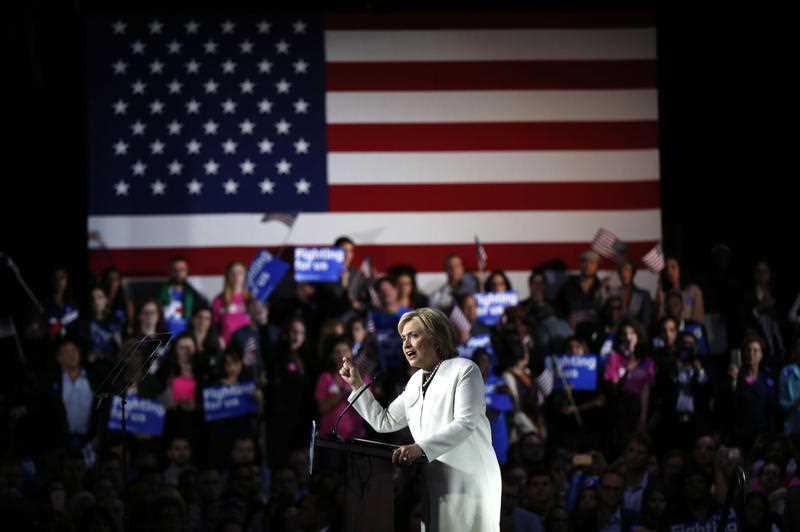A Super Tuesday for Hillary and The Donald
Posted By Tom Switzer on March 3, 2016 @ 14:56
 The Super Tuesday results suggest that the Democratic Party coronation of Hillary Clinton has resumed and that the insurrection that propelled Donald Trump into the Republican Party lead continues unabated. Neither primary nomination contest is over, but the clear delegate advantages for both Clinton and Trump suggest it may be soon. A Hillary-Trump battle in November is no longer a far-fetched scenario. In fact, it’s the most likely outcome.
The Super Tuesday results suggest that the Democratic Party coronation of Hillary Clinton has resumed and that the insurrection that propelled Donald Trump into the Republican Party lead continues unabated. Neither primary nomination contest is over, but the clear delegate advantages for both Clinton and Trump suggest it may be soon. A Hillary-Trump battle in November is no longer a far-fetched scenario. In fact, it’s the most likely outcome.
Trump won all but four states, including Texas, the home state of his closest rival Ted Cruz, who had strong support from the local governor. But although the Texas senator lives to fight another day, his political religiosity is unlikely to play well beyond his base of evangelical voters. Establishment favourite and Florida senator Marco Rubio won his first state in Minnesota. But he remains 20 points behind Trump in Florida; and if he can’t win even his home state on 15 March, he will struggle to stay relevant. Both Rubio and Trump have now based their campaigns in Miami, which indicates the importance of the state’s outcome in a fortnight.
As for Clinton, she also had a big night, winning all but three small states. Her success is not surprising. She has had the organisational prowess, massive fund-raising support and backing of a powerful Democratic establishment of feminists, minorities, green groups and labour unions. Notwithstanding Bernie Sanders’ smashing victory in New Hampshire last month, the 74-year-old socialist was never going to break through the Clinton machine’s ‘firewall’ in the South, where Hillary remains overwhelmingly popular [1] with African-American voters.
One piece of conventional wisdom, shared by even left-liberals, is that the presidency of Barack Obama has been badly adrift. A corollary is that associating too closely with the Obama legacy might carry liabilities. But Clinton, a flawed campaigner, has run mainly as a former cabinet secretary loyal to that legacy. Her victories may have a simple explanation: many Democratic voters simply want more Obama. Or perhaps they think she has the best chance of winning November’s presidential election.
That prospect is more likely if the Republican Party nominates Trump who has once again benefited from a divided field of challengers. His success is difficult for many journalists and intellectuals to stomach, but easy to explain: he taps into a widespread sense of anxiety and anger felt across many parts of Middle America.
At a time when public faith in government and major institutions has hit an all-time low, Trump’s strident anti-Washington message resonate with many folks, especially less affluent, blue-collar workers disoriented by radical socio-economic change of recent times.
As all the available polling evidence makes clear, Trump’s supporters want someone whom they can vent their fury at the Beltway class of politicians and pundits. Policy details aren’t so important. They just want to send someone to Washington who will bang heads and get things done. In these highly polarising times anyone who disagrees with The Donald on anything from deporting 11 million Mexican illegal immigrants to banning Muslims from entering America to ending trade deals is an ‘idiot’ or ‘loser’.
It’s easy to dismiss The Donald as a buffoon and xenophobe, which of course he is. But to understand his extraordinary political rise is to recognise his broader appeal to an angry people. He presents himself not just as a bold Washington outsider, a right-wing shock jock on steroids, who treats both the Obama administration and Republican establishment as if they were criminal conspiracies against the forces of truth and virtue.
Trump also, crucially, presents himself as the living antidote to the notion of American decline. ‘Let’s Make America Great Again!’ is his campaign motto. It’s the rationalisation for the receptivity of many Americans (who don’t usually vote) to The Donald’s leap-in-the-dark campaign. Every day they read of America’s declining influence and power and they find their nation too often seeming hopeless and helpless at home and abroad. Never mind that Trump upsets the sensitivities of virtually every constituency—from Latinos and Muslims to women and even conservative journalists.
What now? Barring a federal indictment over her use of classified material on her private email, Hillary is bound for the Democratic nomination in Philadelphia in July. Sanders will accumulate a sufficient amount of delegates to help make the party platform more liberal, but the Democratic grassroots will rally around Hillary.
As for the Republicans, influential donors and power brokers will fight tooth and nail to ensure that Trump doesn’t win the nomination on the convention floor in Cleveland in July. Many lifelong Republicans and prominent conservative thinkers won’t vote for him, period. Why? Because he violates the principles of small government, activist foreign policy and an inclusive conservatism that has shaped the party of Reagan for generations. He is not, simply put, one of them, but an outsider with no core philosophical beliefs. Moreover, many leading Republican figures fret—with good reason—that a Trump candidacy will probably split the conservative vote, turn off Independents in the political centre, alienate a fast-growing bloc of Latino voters and unite Democrats around a flawed candidate in Clinton.
Then again, in a highly volatile and unpredictable political season, who knows? Turnout is crucial in a nation with voluntary voting. Trump inspires more enthusiasm on the campaign trail than Hillary. Get ready for a wild election season.
Article printed from The Strategist: https://aspistrategist.ru
URL to article: /a-super-tuesday-for-hillary-and-the-donald-2/
URLs in this post:
[1] overwhelmingly popular: http://www.npr.org/2016/03/01/468185698/understanding-the-clintons-popularity-with-black-voters
Click here to print.